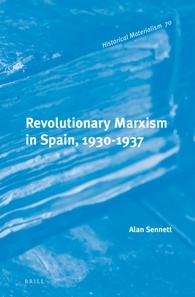Alan Sennett, Open University
Revolutionary Marxism in Spain, 1930-1937 examines the impact of Trotsky’s political thought upon those Spanish communists who dissented from the ‘general line’ laid down by Moscow. It explores the political ideas of leading POUM figures, Andreu Nin and Joaquín Maurín, and their complex relationship with Trotsky. The contention is that the POUM owed far more to Trotsky than many of the party’s historians care to admit. Drawing heavily upon Spanish sources, the book seeks to present and explain the POUM’s political ideas in order to understand why the party adopted the positions it did. The author engages with broader scholarly debates around the role of the POUM in the Spanish Civil War and Revolution, especially those surrounding the Popular Front.
Biographical note
Readership
Table of contents
List of Abbreviations
Introduction
1: Trotsky’s Theory of Revolution
1.1 Uneven and combined development
1.2 Permanent revolution
1.3 Critical perspectives on permanent revolution
1.4 Theorising revolutionary crises
1.5 Permanent revolution since Trotsky
1.6 Conclusion
2: Trotsky on Spain
2.1 Spain’s uneven and combined development
2.2 The problems of revolutionary agency
2.3 War and revolution
2.4 Conclusion
3: Revolutionary Marxists in Spain, 1930–1934 95
3.1 From socialism and syndicalism to revolutionary Marxism 96
3.2 Nin and the problems of the Spanish Revolution 100
3.3 Maurín and the problems of the Spanish Revolution 106
3.4 Areas of divergence and convergence 113
3.5 Conclusion 117
4: The Threat of Fascism and the Challenge of Workers’ Unity 119
4.1 The Spanish workers’ movement 120
4.2 The threat of fascism 134
4.3 Entryism or fusion? 142
4.4 Conclusion 146
5: Marxist Unity: The Creation of the POUM 149
5.1 Fusion or Absorption? 150
5.2 The POUM’s Programme 151
5.3 Conclusion 156
6: The POUM and the Popular Front 159
6.1 The coming of the Popular Front 160
6.2 Military rising and revolutionary response 171
6.3 The Generalitat 176
6.4 Conclusion 182
7: Defending the Revolution 184
7.1 The campaign against the POUM 184
7.2 May 1937 193
7.3 The suppression of the POUM 199
7.4 Conclusion 203
Conclusion 209
Appendix: Historical Essay 218
Spain’s transition to capitalism 218
Spain’s bourgeois revolution 225
The workers’ movement 232
The Second Republic 238
The Civil War 242
References
Index

